Ethical Breaches in Nursing: A Case Study Analysis
VerifiedAdded on 2022/09/14
|7
|1442
|17
Case Study
AI Summary
This case study examines a scenario involving a patient who experienced a breach of confidentiality and a violation of informed consent and autonomy. A young man, treated at a hospital after a bicycle accident, later received contact from a research institution that obtained his personal information from the hospital without his consent. The subsequent research interview, conducted without respecting the patient's emotional state or right to refuse participation, further highlighted ethical failings. The analysis focuses on the ethical duties of healthcare professionals to maintain patient privacy, obtain informed consent, and respect patient autonomy, emphasizing the importance of ethical guidelines in both clinical practice and research settings. The study highlights the importance of adhering to ethical principles like confidentiality, informed consent, and the right to refuse participation to protect patient rights and maintain trust in healthcare and research.
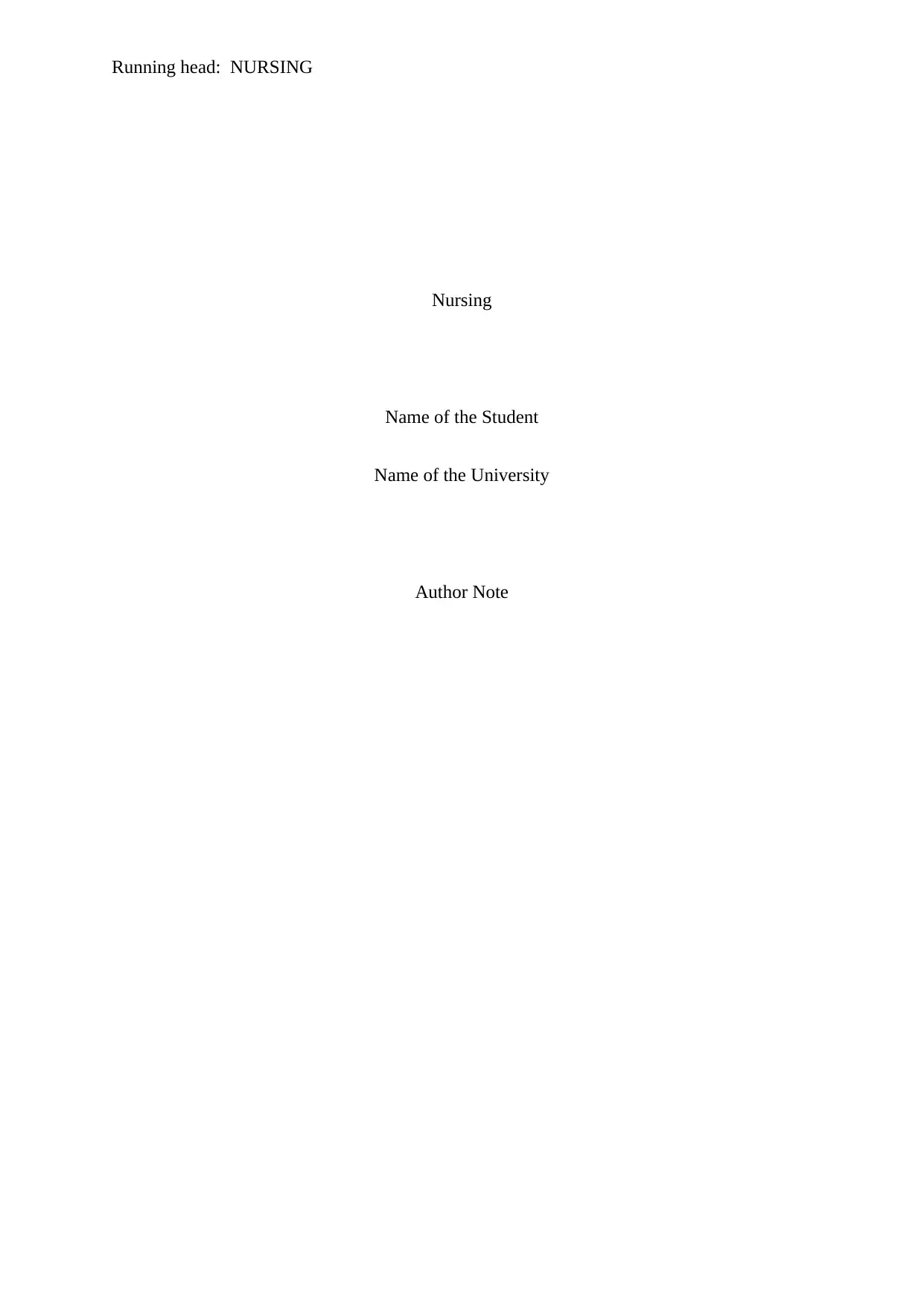
Running head: NURSING
Nursing
Name of the Student
Name of the University
Author Note
Nursing
Name of the Student
Name of the University
Author Note
Paraphrase This Document
Need a fresh take? Get an instant paraphrase of this document with our AI Paraphraser
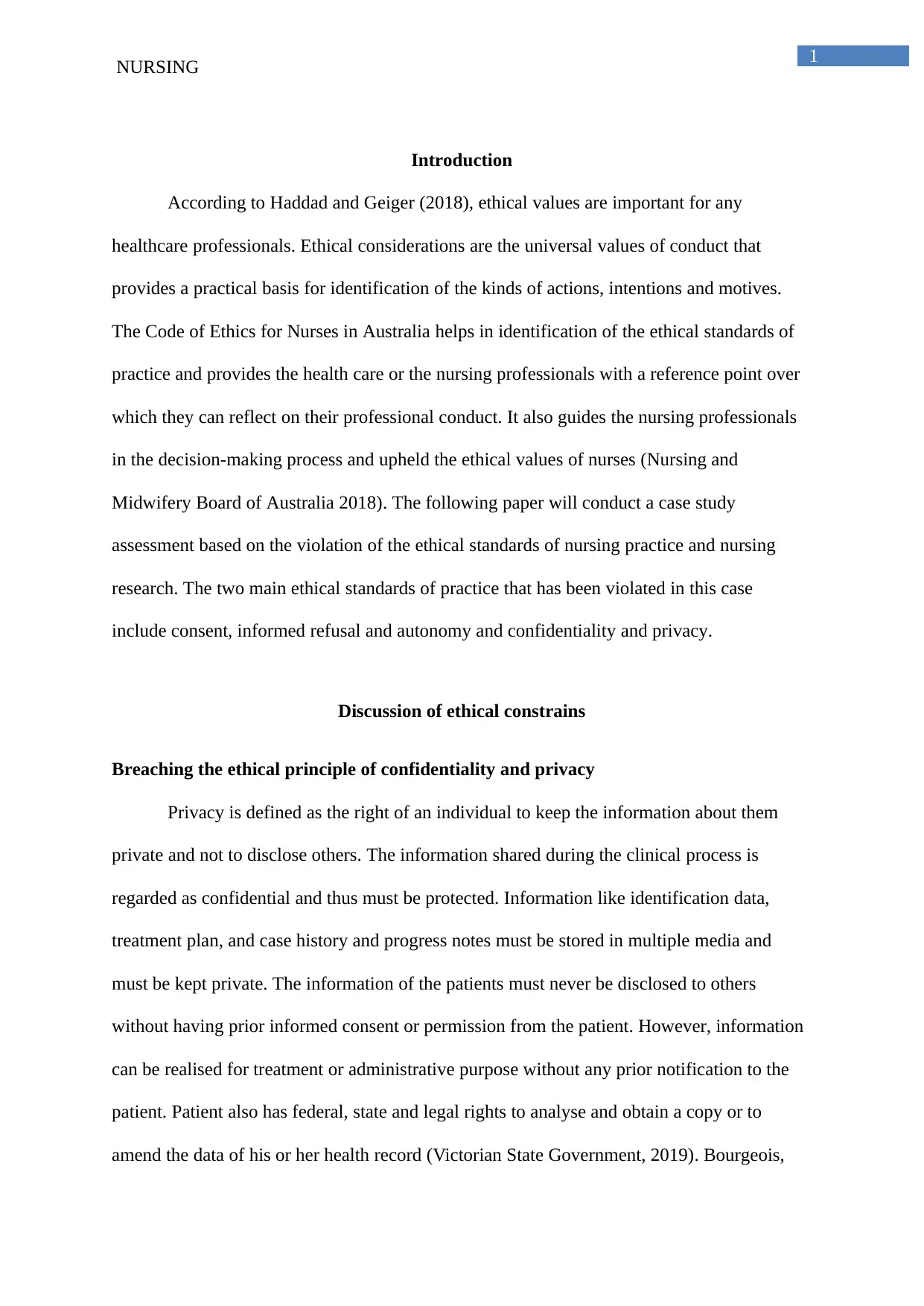
1
NURSING
Introduction
According to Haddad and Geiger (2018), ethical values are important for any
healthcare professionals. Ethical considerations are the universal values of conduct that
provides a practical basis for identification of the kinds of actions, intentions and motives.
The Code of Ethics for Nurses in Australia helps in identification of the ethical standards of
practice and provides the health care or the nursing professionals with a reference point over
which they can reflect on their professional conduct. It also guides the nursing professionals
in the decision-making process and upheld the ethical values of nurses (Nursing and
Midwifery Board of Australia 2018). The following paper will conduct a case study
assessment based on the violation of the ethical standards of nursing practice and nursing
research. The two main ethical standards of practice that has been violated in this case
include consent, informed refusal and autonomy and confidentiality and privacy.
Discussion of ethical constrains
Breaching the ethical principle of confidentiality and privacy
Privacy is defined as the right of an individual to keep the information about them
private and not to disclose others. The information shared during the clinical process is
regarded as confidential and thus must be protected. Information like identification data,
treatment plan, and case history and progress notes must be stored in multiple media and
must be kept private. The information of the patients must never be disclosed to others
without having prior informed consent or permission from the patient. However, information
can be realised for treatment or administrative purpose without any prior notification to the
patient. Patient also has federal, state and legal rights to analyse and obtain a copy or to
amend the data of his or her health record (Victorian State Government, 2019). Bourgeois,
NURSING
Introduction
According to Haddad and Geiger (2018), ethical values are important for any
healthcare professionals. Ethical considerations are the universal values of conduct that
provides a practical basis for identification of the kinds of actions, intentions and motives.
The Code of Ethics for Nurses in Australia helps in identification of the ethical standards of
practice and provides the health care or the nursing professionals with a reference point over
which they can reflect on their professional conduct. It also guides the nursing professionals
in the decision-making process and upheld the ethical values of nurses (Nursing and
Midwifery Board of Australia 2018). The following paper will conduct a case study
assessment based on the violation of the ethical standards of nursing practice and nursing
research. The two main ethical standards of practice that has been violated in this case
include consent, informed refusal and autonomy and confidentiality and privacy.
Discussion of ethical constrains
Breaching the ethical principle of confidentiality and privacy
Privacy is defined as the right of an individual to keep the information about them
private and not to disclose others. The information shared during the clinical process is
regarded as confidential and thus must be protected. Information like identification data,
treatment plan, and case history and progress notes must be stored in multiple media and
must be kept private. The information of the patients must never be disclosed to others
without having prior informed consent or permission from the patient. However, information
can be realised for treatment or administrative purpose without any prior notification to the
patient. Patient also has federal, state and legal rights to analyse and obtain a copy or to
amend the data of his or her health record (Victorian State Government, 2019). Bourgeois,
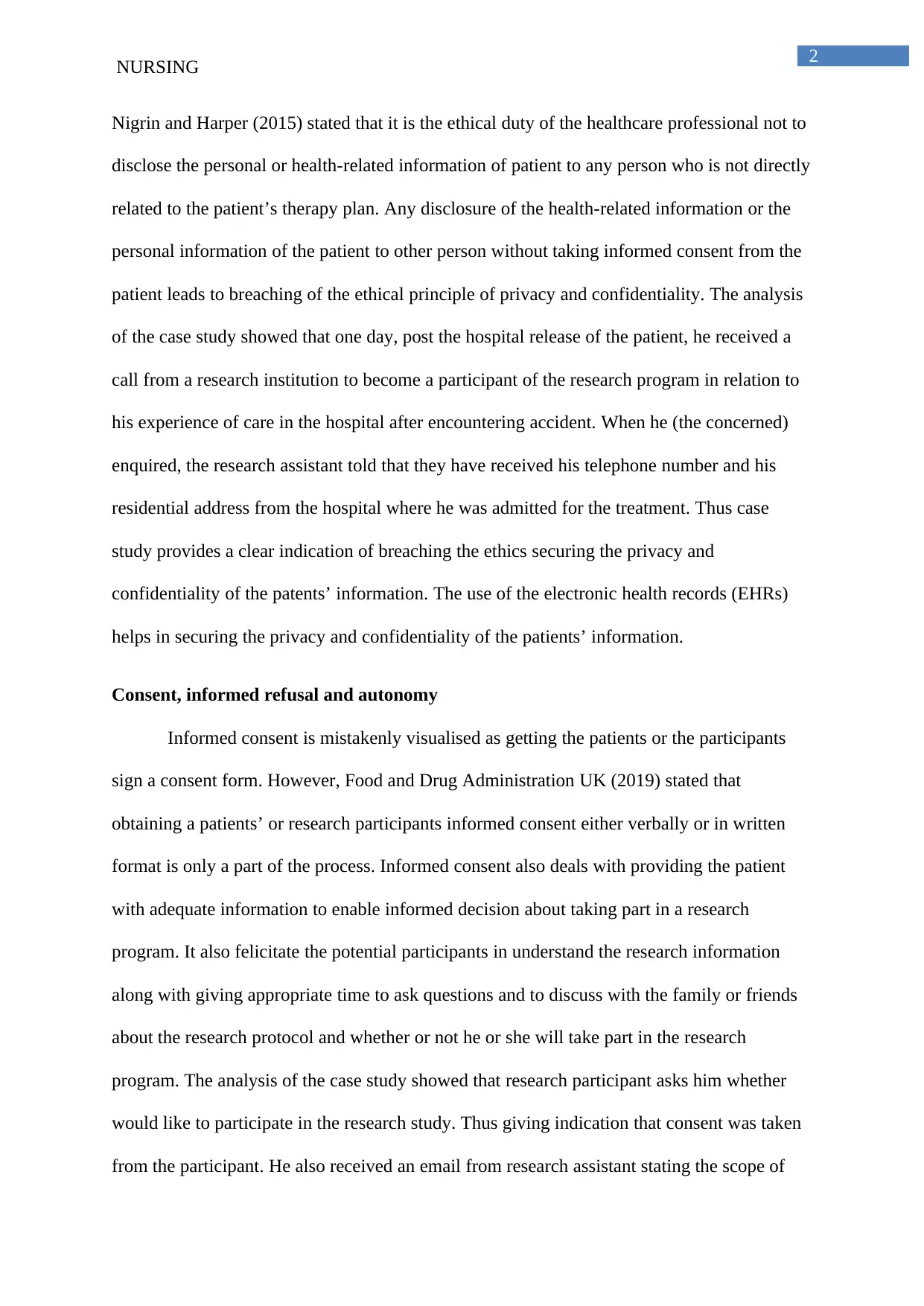
2
NURSING
Nigrin and Harper (2015) stated that it is the ethical duty of the healthcare professional not to
disclose the personal or health-related information of patient to any person who is not directly
related to the patient’s therapy plan. Any disclosure of the health-related information or the
personal information of the patient to other person without taking informed consent from the
patient leads to breaching of the ethical principle of privacy and confidentiality. The analysis
of the case study showed that one day, post the hospital release of the patient, he received a
call from a research institution to become a participant of the research program in relation to
his experience of care in the hospital after encountering accident. When he (the concerned)
enquired, the research assistant told that they have received his telephone number and his
residential address from the hospital where he was admitted for the treatment. Thus case
study provides a clear indication of breaching the ethics securing the privacy and
confidentiality of the patents’ information. The use of the electronic health records (EHRs)
helps in securing the privacy and confidentiality of the patients’ information.
Consent, informed refusal and autonomy
Informed consent is mistakenly visualised as getting the patients or the participants
sign a consent form. However, Food and Drug Administration UK (2019) stated that
obtaining a patients’ or research participants informed consent either verbally or in written
format is only a part of the process. Informed consent also deals with providing the patient
with adequate information to enable informed decision about taking part in a research
program. It also felicitate the potential participants in understand the research information
along with giving appropriate time to ask questions and to discuss with the family or friends
about the research protocol and whether or not he or she will take part in the research
program. The analysis of the case study showed that research participant asks him whether
would like to participate in the research study. Thus giving indication that consent was taken
from the participant. He also received an email from research assistant stating the scope of
NURSING
Nigrin and Harper (2015) stated that it is the ethical duty of the healthcare professional not to
disclose the personal or health-related information of patient to any person who is not directly
related to the patient’s therapy plan. Any disclosure of the health-related information or the
personal information of the patient to other person without taking informed consent from the
patient leads to breaching of the ethical principle of privacy and confidentiality. The analysis
of the case study showed that one day, post the hospital release of the patient, he received a
call from a research institution to become a participant of the research program in relation to
his experience of care in the hospital after encountering accident. When he (the concerned)
enquired, the research assistant told that they have received his telephone number and his
residential address from the hospital where he was admitted for the treatment. Thus case
study provides a clear indication of breaching the ethics securing the privacy and
confidentiality of the patents’ information. The use of the electronic health records (EHRs)
helps in securing the privacy and confidentiality of the patients’ information.
Consent, informed refusal and autonomy
Informed consent is mistakenly visualised as getting the patients or the participants
sign a consent form. However, Food and Drug Administration UK (2019) stated that
obtaining a patients’ or research participants informed consent either verbally or in written
format is only a part of the process. Informed consent also deals with providing the patient
with adequate information to enable informed decision about taking part in a research
program. It also felicitate the potential participants in understand the research information
along with giving appropriate time to ask questions and to discuss with the family or friends
about the research protocol and whether or not he or she will take part in the research
program. The analysis of the case study showed that research participant asks him whether
would like to participate in the research study. Thus giving indication that consent was taken
from the participant. He also received an email from research assistant stating the scope of
⊘ This is a preview!⊘
Do you want full access?
Subscribe today to unlock all pages.

Trusted by 1+ million students worldwide
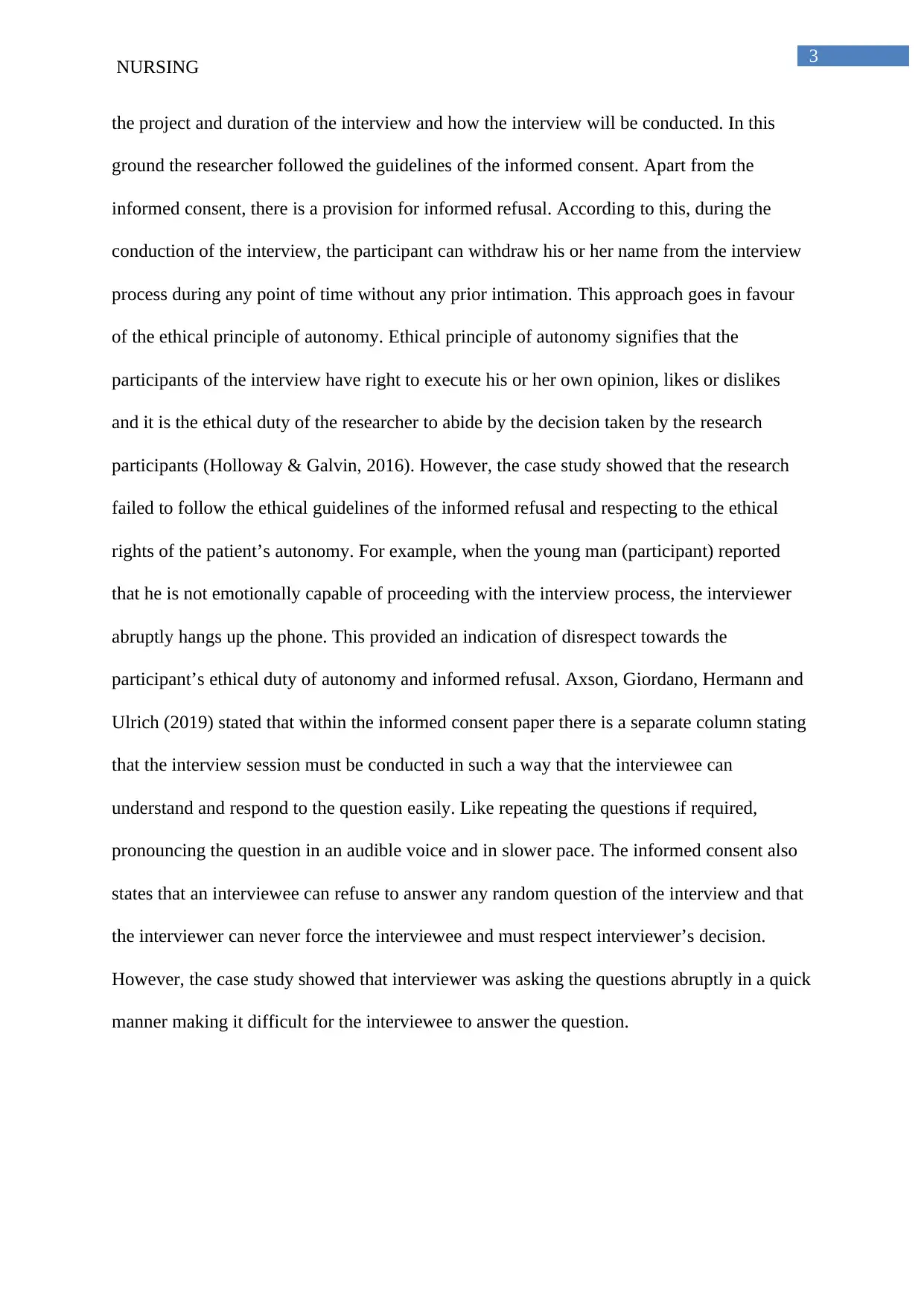
3
NURSING
the project and duration of the interview and how the interview will be conducted. In this
ground the researcher followed the guidelines of the informed consent. Apart from the
informed consent, there is a provision for informed refusal. According to this, during the
conduction of the interview, the participant can withdraw his or her name from the interview
process during any point of time without any prior intimation. This approach goes in favour
of the ethical principle of autonomy. Ethical principle of autonomy signifies that the
participants of the interview have right to execute his or her own opinion, likes or dislikes
and it is the ethical duty of the researcher to abide by the decision taken by the research
participants (Holloway & Galvin, 2016). However, the case study showed that the research
failed to follow the ethical guidelines of the informed refusal and respecting to the ethical
rights of the patient’s autonomy. For example, when the young man (participant) reported
that he is not emotionally capable of proceeding with the interview process, the interviewer
abruptly hangs up the phone. This provided an indication of disrespect towards the
participant’s ethical duty of autonomy and informed refusal. Axson, Giordano, Hermann and
Ulrich (2019) stated that within the informed consent paper there is a separate column stating
that the interview session must be conducted in such a way that the interviewee can
understand and respond to the question easily. Like repeating the questions if required,
pronouncing the question in an audible voice and in slower pace. The informed consent also
states that an interviewee can refuse to answer any random question of the interview and that
the interviewer can never force the interviewee and must respect interviewer’s decision.
However, the case study showed that interviewer was asking the questions abruptly in a quick
manner making it difficult for the interviewee to answer the question.
NURSING
the project and duration of the interview and how the interview will be conducted. In this
ground the researcher followed the guidelines of the informed consent. Apart from the
informed consent, there is a provision for informed refusal. According to this, during the
conduction of the interview, the participant can withdraw his or her name from the interview
process during any point of time without any prior intimation. This approach goes in favour
of the ethical principle of autonomy. Ethical principle of autonomy signifies that the
participants of the interview have right to execute his or her own opinion, likes or dislikes
and it is the ethical duty of the researcher to abide by the decision taken by the research
participants (Holloway & Galvin, 2016). However, the case study showed that the research
failed to follow the ethical guidelines of the informed refusal and respecting to the ethical
rights of the patient’s autonomy. For example, when the young man (participant) reported
that he is not emotionally capable of proceeding with the interview process, the interviewer
abruptly hangs up the phone. This provided an indication of disrespect towards the
participant’s ethical duty of autonomy and informed refusal. Axson, Giordano, Hermann and
Ulrich (2019) stated that within the informed consent paper there is a separate column stating
that the interview session must be conducted in such a way that the interviewee can
understand and respond to the question easily. Like repeating the questions if required,
pronouncing the question in an audible voice and in slower pace. The informed consent also
states that an interviewee can refuse to answer any random question of the interview and that
the interviewer can never force the interviewee and must respect interviewer’s decision.
However, the case study showed that interviewer was asking the questions abruptly in a quick
manner making it difficult for the interviewee to answer the question.
Paraphrase This Document
Need a fresh take? Get an instant paraphrase of this document with our AI Paraphraser
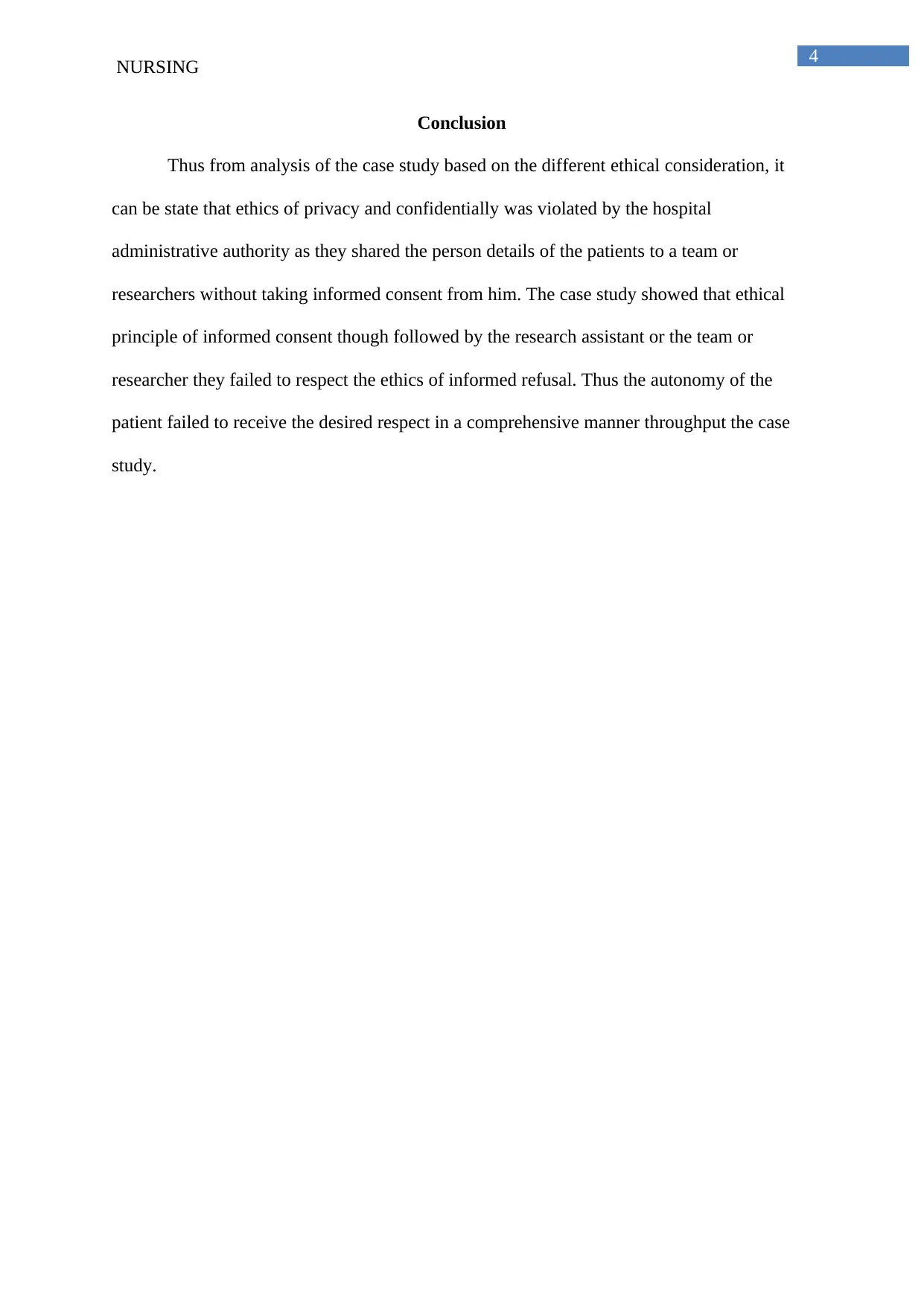
4
NURSING
Conclusion
Thus from analysis of the case study based on the different ethical consideration, it
can be state that ethics of privacy and confidentially was violated by the hospital
administrative authority as they shared the person details of the patients to a team or
researchers without taking informed consent from him. The case study showed that ethical
principle of informed consent though followed by the research assistant or the team or
researcher they failed to respect the ethics of informed refusal. Thus the autonomy of the
patient failed to receive the desired respect in a comprehensive manner throughput the case
study.
NURSING
Conclusion
Thus from analysis of the case study based on the different ethical consideration, it
can be state that ethics of privacy and confidentially was violated by the hospital
administrative authority as they shared the person details of the patients to a team or
researchers without taking informed consent from him. The case study showed that ethical
principle of informed consent though followed by the research assistant or the team or
researcher they failed to respect the ethics of informed refusal. Thus the autonomy of the
patient failed to receive the desired respect in a comprehensive manner throughput the case
study.
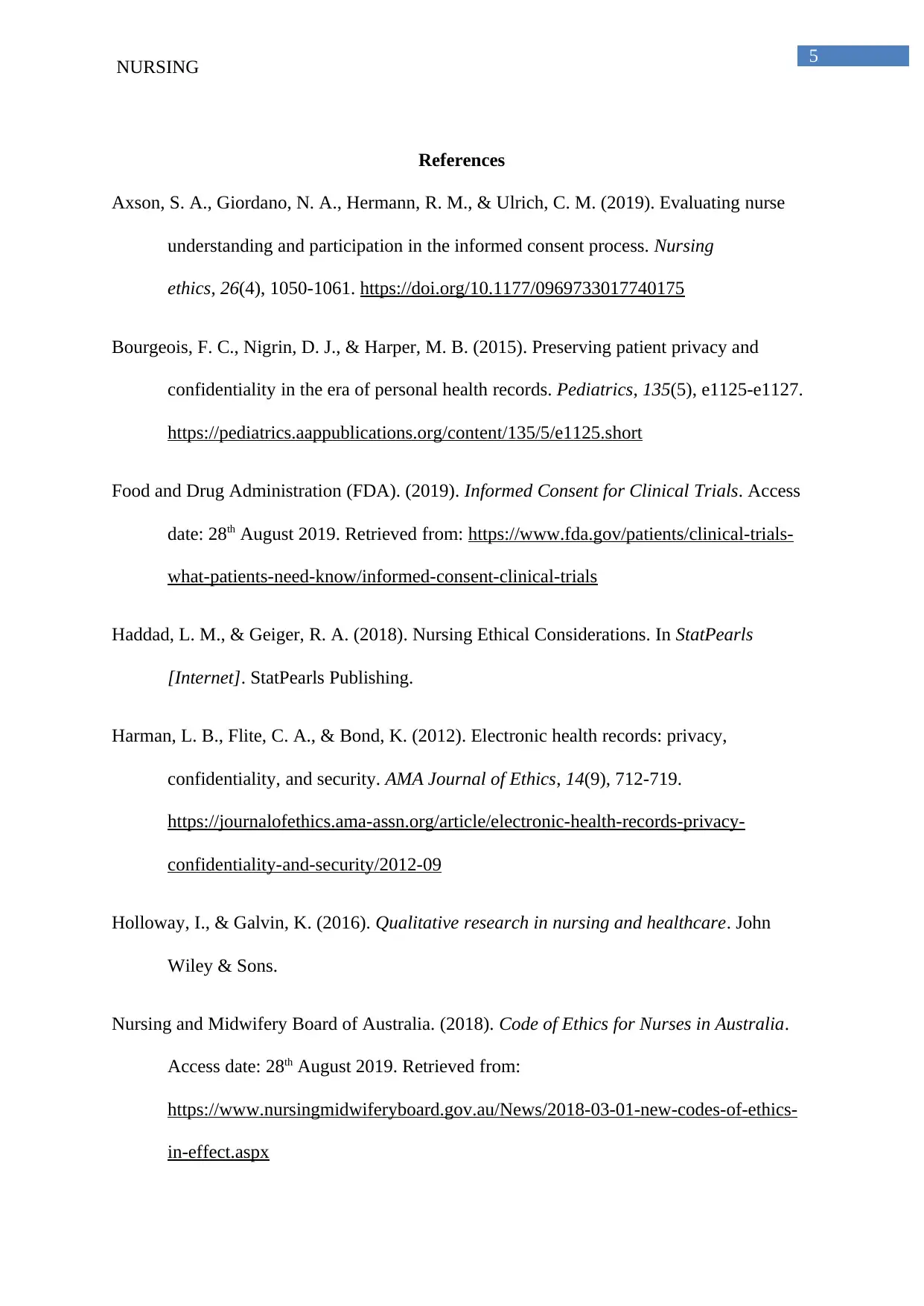
5
NURSING
References
Axson, S. A., Giordano, N. A., Hermann, R. M., & Ulrich, C. M. (2019). Evaluating nurse
understanding and participation in the informed consent process. Nursing
ethics, 26(4), 1050-1061. https://doi.org/10.1177/0969733017740175
Bourgeois, F. C., Nigrin, D. J., & Harper, M. B. (2015). Preserving patient privacy and
confidentiality in the era of personal health records. Pediatrics, 135(5), e1125-e1127.
https://pediatrics.aappublications.org/content/135/5/e1125.short
Food and Drug Administration (FDA). (2019). Informed Consent for Clinical Trials. Access
date: 28th August 2019. Retrieved from: https://www.fda.gov/patients/clinical-trials-
what-patients-need-know/informed-consent-clinical-trials
Haddad, L. M., & Geiger, R. A. (2018). Nursing Ethical Considerations. In StatPearls
[Internet]. StatPearls Publishing.
Harman, L. B., Flite, C. A., & Bond, K. (2012). Electronic health records: privacy,
confidentiality, and security. AMA Journal of Ethics, 14(9), 712-719.
https://journalofethics.ama-assn.org/article/electronic-health-records-privacy-
confidentiality-and-security/2012-09
Holloway, I., & Galvin, K. (2016). Qualitative research in nursing and healthcare. John
Wiley & Sons.
Nursing and Midwifery Board of Australia. (2018). Code of Ethics for Nurses in Australia.
Access date: 28th August 2019. Retrieved from:
https://www.nursingmidwiferyboard.gov.au/News/2018-03-01-new-codes-of-ethics-
in-effect.aspx
NURSING
References
Axson, S. A., Giordano, N. A., Hermann, R. M., & Ulrich, C. M. (2019). Evaluating nurse
understanding and participation in the informed consent process. Nursing
ethics, 26(4), 1050-1061. https://doi.org/10.1177/0969733017740175
Bourgeois, F. C., Nigrin, D. J., & Harper, M. B. (2015). Preserving patient privacy and
confidentiality in the era of personal health records. Pediatrics, 135(5), e1125-e1127.
https://pediatrics.aappublications.org/content/135/5/e1125.short
Food and Drug Administration (FDA). (2019). Informed Consent for Clinical Trials. Access
date: 28th August 2019. Retrieved from: https://www.fda.gov/patients/clinical-trials-
what-patients-need-know/informed-consent-clinical-trials
Haddad, L. M., & Geiger, R. A. (2018). Nursing Ethical Considerations. In StatPearls
[Internet]. StatPearls Publishing.
Harman, L. B., Flite, C. A., & Bond, K. (2012). Electronic health records: privacy,
confidentiality, and security. AMA Journal of Ethics, 14(9), 712-719.
https://journalofethics.ama-assn.org/article/electronic-health-records-privacy-
confidentiality-and-security/2012-09
Holloway, I., & Galvin, K. (2016). Qualitative research in nursing and healthcare. John
Wiley & Sons.
Nursing and Midwifery Board of Australia. (2018). Code of Ethics for Nurses in Australia.
Access date: 28th August 2019. Retrieved from:
https://www.nursingmidwiferyboard.gov.au/News/2018-03-01-new-codes-of-ethics-
in-effect.aspx
⊘ This is a preview!⊘
Do you want full access?
Subscribe today to unlock all pages.

Trusted by 1+ million students worldwide
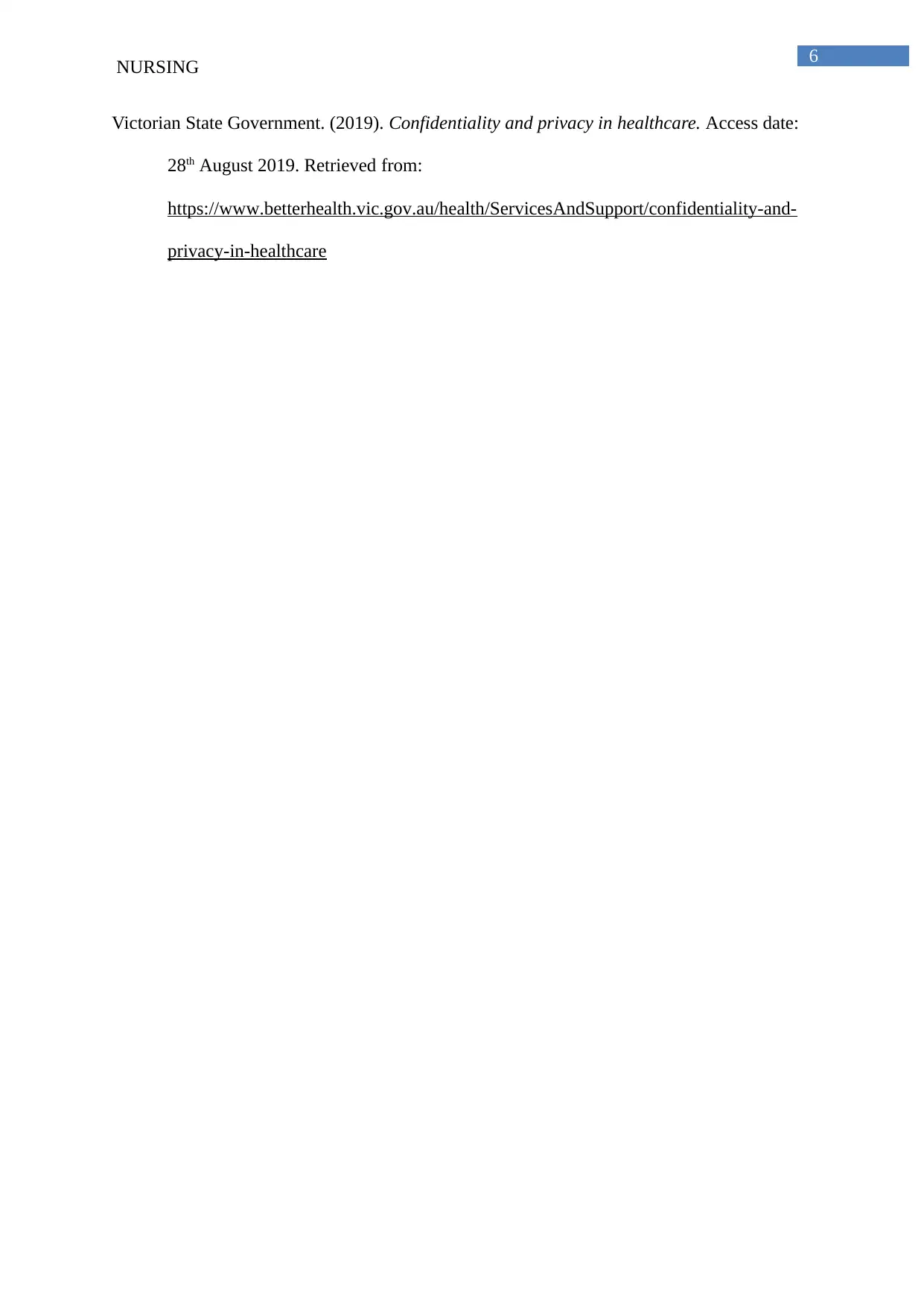
6
NURSING
Victorian State Government. (2019). Confidentiality and privacy in healthcare. Access date:
28th August 2019. Retrieved from:
https://www.betterhealth.vic.gov.au/health/ServicesAndSupport/confidentiality-and-
privacy-in-healthcare
NURSING
Victorian State Government. (2019). Confidentiality and privacy in healthcare. Access date:
28th August 2019. Retrieved from:
https://www.betterhealth.vic.gov.au/health/ServicesAndSupport/confidentiality-and-
privacy-in-healthcare
1 out of 7
Related Documents
Your All-in-One AI-Powered Toolkit for Academic Success.
+13062052269
info@desklib.com
Available 24*7 on WhatsApp / Email
![[object Object]](/_next/static/media/star-bottom.7253800d.svg)
Unlock your academic potential
Copyright © 2020–2026 A2Z Services. All Rights Reserved. Developed and managed by ZUCOL.





